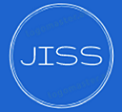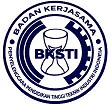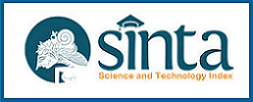STRUKTUR KREASI PENGETAHUAN UNTUK PROSES INOVASI (KPUPI) PADA IKM SUKU CADANG BERBASIS KARET
Abstract
Penelitian tentang kreasi pengetahuan untuk proses inovasi (KPUPI), utamanya pada industri kecil dan menengah (IKM), adalah masih relatif terbatas. Penelitian ini bertujuan untuk mengidentifikasi dan menganalisis praktek- praktek kreasi pengetahuan, inovasi, dan mendapatkan model struktural KPUPI pada IKM suku cadang berbasis karet. Data penelitian diperoleh melalui wawancara mendalam, pengamatan partisipatif, angket dan focus group discussions (FGD), dan pengembangan struktur model KPUPI dengan teknik interpretive structural modeling (ISM). Hasil penelitian menunjukan bahwa type dan pola-pola inovasi pada kasus IKM suku cadang lebih dominan inovasi proses, sedangkan proses kreasi pengetahuan yang dominan adalah kombinasi pengetahuan, hasil analisis model struktural proses KPUPI memiliki empat elemen aktivitas dengan masing-masing sub-elemen aktivitas kuncinya yaitu sosialisasi, eksternalisasi, kombinasi dan internalisasi pengetahuan.
Keywords
Full Text:
PDFReferences
Alavi M, Leidner D. 2001. Knowledge Management System: Issue, Challenges and Benefits. Communications of the Association for Information System, 1(7): 2-41
Attri R, Dev N, Sharma N. 2013. Interpretive Stuctural Modeling (ISM) Approach: An Overview Research Journal Of Management Sciences. 2 (2): 3-8
Chou S.W and He M.Y. (2004) Knowledge Management the Distinctive Roles Of Knowledge Assets In Facilitating Knowledge Creation. Journal Of Information Science. 30(2): 146-164.
[Deperindag] Direktorat Jenderal Industri Kecil dan Menengah. 2013. Kajian Pengembangan Kompetensi Inti Daerah. Kabupaten Bandung.
Chandramowli S, Transue M, Felder F A. 2011. Analysis Of Barrier To Development in Landfill Communities Using Interpretive Structural Modeling. Habitat Internaltional, 35 (2): 246-253.
Forsman H. 2001. Innovation Capacity And Innovation Development In Small Enterprises; a Comparison Between the Manufacturing and Service Sectors. Res Policy. 40 (5): 739–750.
Gunday G, Ulosoy G, Kilic K, Alpkan L. 2011. Effects Of Innovation Types On Firm Performance. Int J Produc Eco. 133 (2): 662–676.
Li Y.H, Huang J.W.Tsai M.T. (2009) Enterpreuneurial Orientation and Firm Performance: The Role Of Knowledge Creation Process. Industrial Marketing Management. 36:440-449.
Lee H, Choi B. 2003. Knowledge Management Enablers, Processes, and Organizational Performance: An Integrative View and Empirical Examination. Journal of Management Information System/Summer, 20 (1):179-228.
Nonaka I. 1994. A Dynamic Theory of Organizational Knowledge Creation, Organization Science, 5 (1):14- 37.
Oke A, Burke G, dan Myers A. 2007. Innovation types and performance in growing UK SMEs. Int J Opr Prod Mgmt. 27(7): 735 – 753.
[OECD] Organisation for Economic Co-operation and Development. 2005. Oslo Manual; Guidelines for Collecting and Interpreting Technological Innovation Data. Organization for Economic Cooperation and Development-Committee for Scientific and Technological Policy, Paris.
Quintane E, Casselman RM, Reiche B, Nylund P. 2011. Innovation as A Knowledge-Based Outcome. Journal of Knowledge Management. 15(6): 928-947.
Rosenbusch, N., Brinckmann, J. and Bausch, A. (2011), Is innovation always beneficial? A meta-analysis of the relationship between innovation and performance in SMEs, Journal of Business Venturing, 26: 441-457.
Rubenstein-Montano B, Liebowitz J, Buchwalter J, McCaw D, Newman B, Rebeck K. 2001. A Systems Thinking Framework for Knowledge Management. Decision Support System. 31:5-16.
Saxena J J P, Sushil, Vrat P. 1992. Hierarchy And Classification Of Program Plan Element Using Interpretive Structural Modeling. System Practice. 5 (6): 651 – 670.
Schulze A, Hoegl M. 2008. Knowledge Creation in New Product Development Project. Journal of Management. 32 (2): 210-236.
Teerajetgul W, Charoenngam C. (2006). Factors Inducing Knowledge Creation: Empirical Evidence From Thai Construction Project. Engineering Construction and Architectural Management. 13(6): 584-599.
Xu J, Houssin R, Caillaud E, Gardoni M. 2010. Macro Process Of Knowledge Management For Continuous Innovation. J Know Mgment. 14 (4):573–591.
DOI: http://dx.doi.org/10.36055/jiss.v3i1c.2095
Refbacks
- There are currently no refbacks.
 is supported by
is supported by








